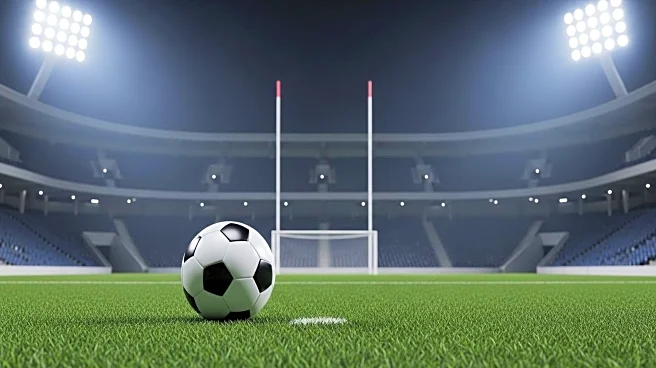What's Happening?
Billy Vigar, a former Arsenal youth player, has died at the age of 21 after sustaining a significant brain injury during a non-league match in England. The incident occurred when Vigar collided with a concrete wall while trying to keep the ball in play during a game at Wingate and Finchley. Following the collision, he was placed in an induced coma and underwent surgery in an attempt to aid his recovery. Unfortunately, Vigar passed away on Thursday due to his injuries. Chichester City Football Club, where Vigar was playing, confirmed his death and requested privacy for his family during this difficult time. Arsenal, where Vigar had been an academy player since 2017, expressed their devastation at the news, describing him as a powerful and versatile forward.
Why It's Important?
The tragic death of Billy Vigar highlights the risks associated with sports, particularly in non-league settings where safety measures may not be as stringent as in professional leagues. This incident may prompt discussions about improving safety standards in lower-tier football matches to prevent similar accidents. The loss of a young athlete in the prime of his life is a stark reminder of the physical dangers inherent in sports, and it underscores the need for ongoing evaluation of safety protocols. The impact of Vigar's death is felt deeply within the football community, as evidenced by the postponement of Chichester City's scheduled match and the planned tributes across the Isthmian League Premier Division.
What's Next?
In response to Vigar's death, the Isthmian League Premier Division has announced that a moment of silence will be observed before all matches this weekend, and players will wear black armbands to honor his memory. This gesture reflects the league's solidarity and respect for Vigar and his family. It is likely that discussions regarding safety measures in non-league football will continue, potentially leading to changes in how matches are conducted to ensure player safety. Clubs and leagues may review their current protocols to prevent future tragedies, considering factors such as the proximity of hard surfaces to the playing field.
Beyond the Headlines
The incident raises broader questions about the safety of sports environments, particularly in non-professional settings. It may lead to increased scrutiny of facilities and the implementation of more rigorous safety standards. Additionally, the emotional and psychological impact on players, coaches, and fans who witnessed the accident could be significant, necessitating support and counseling services. The football community's response to Vigar's death, including tributes and moments of silence, reflects the deep sense of loss and the importance of community support in times of tragedy.









